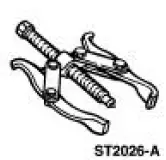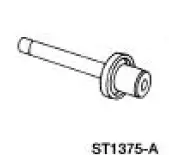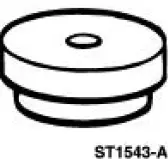Ford Mustang (1999-2004) Service Manual: Differential Case and Ring Gear
Special Tool(s)
 |
2-Jaw Puller 205-D072 (D97L-4221-A) or equivalent |
 |
Installer, Differential Side Bearing 205-009 (T57L-4221-A1) |
 |
Step Plate 205-D016 (D80L-630-5) or equivalent |
 Axle Assembly
Axle Assembly
Removal and Installation
1. CAUTION: The vehicle must be on level ground and at curb height.
Mark the rear shock absorbers relative to their protective sleeve.
During installation, raise the suspen ...
 Disassembly
Disassembly
1. Remove the differential assembly from the differential housing. For
additional information, refer
to Differential Case in this section.
2. Remove the bolts.
3. CAUTION: Do not damage the thread ...
Other materials:
Changing a road wheel
WARNING: The use of tire sealants may damage your tire
pressure monitoring system and should not be used. However, if
you must use a sealant, have an authorized dealer install a new tire
pressure monitoring system sensor and valve stem.
WARNING: See Tire Press ...
Emission control system
WARNING: Do not park, idle, or drive your vehicle in dry grass
or other dry ground cover. The emission system heats up the
engine compartment and exhaust system, which can start a fire.
WARNING: Exhaust leaks may result in entry of harmful and
potentially leth ...
Handles, Locks, Latches And Mechanisms (Description and Operation)
Lock Cylinders
Individual lock cylinders are repaired by discarding the inoperative
lock cylinder and building a new
lock cylinder using the appropriate lock repair package. The lock repair
package includes a detailed
instruction sheet to build the ...
